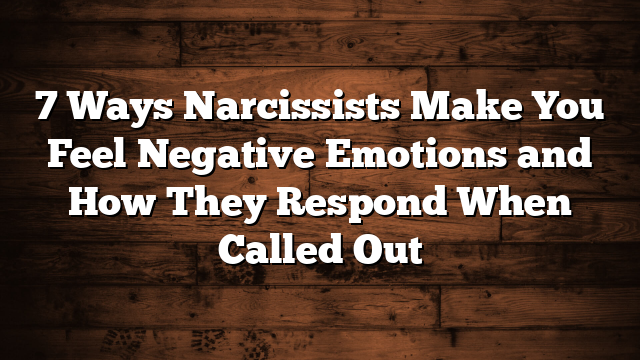7 Ways Narcissists Make You Feel Negative Emotions and How They Respond When Called Out

7 Ways Narcissists Make You Feel Negative Emotions and How They Respond When Called Out
Narcissists are masters at manipulating emotions, leaving their targets feeling confused, insecure, and emotionally drained. Their tactics are designed to undermine your self-esteem and maintain control over you. Here’s a deeper look at seven negative ways narcissists make you feel and their responses when you confront their behaviour:
A Narcissists Handbook: The ultimate guide to understanding and overcoming narcissistic and emotional abuse.
- Unworthy: Narcissists constantly criticise and belittle you, focusing on your flaws and shortcomings while dismissing your strengths. This ongoing negativity aims to erode your self-esteem, making you feel like you’re never good enough. When you bring up their hurtful comments, they might respond with, “You’re too sensitive,” deflecting responsibility and invalidating your feelings. This response not only makes you question your reactions but also reinforces their position of superiority.
- Guilty: Narcissists excel at guilt-tripping, making you feel responsible for their unhappiness or unmet needs. They may use statements like, “I’ve done so much for you, and this is how you repay me?” to manipulate you into complying with their demands. This tactic shifts the focus from their unreasonable expectations to your supposed failings, making you feel unjustly guilty and compelled to meet their endless demands.
- Confused: Through gaslighting, narcissists distort reality to make you doubt your own perceptions and memories. They might deny that certain events occurred or twist the truth to suit their narrative, leaving you disoriented and questioning your sanity. When you challenge their version of events, they might respond with, “That never happened. You’re imagining things,” which further destabilises your sense of reality and increases their control over you.
- Isolated: Narcissists often isolate you from friends and family to increase their control over you. They may create conflicts or sow distrust between you and your loved ones, making you more reliant on them. If you confront them about this isolation, they might say, “They don’t care about you like I do,” manipulating you into believing that only they truly understand and support you. This tactic deepens your dependence on the narcissist, further isolating you from your support network.
- Fearful: Narcissists use threats and intimidation to control your behaviour, making you fear upsetting them. This fear can prevent you from expressing your true feelings or standing up for yourself. When you call out their intimidating behaviour, they might retort with, “You’re overreacting,” dismissing your genuine concerns and making you question whether your fears are justified. This response reinforces their control and keeps you in a state of constant apprehension.
- Exhausted: The relentless emotional manipulation and high demands of a narcissist can leave you feeling drained and exhausted. They may dismiss your feelings of fatigue by accusing you of being lazy or ungrateful. Statements like, “You’re just lazy,” turn your exhaustion into a personal fault, further depleting your energy and making you feel inadequate. This tactic keeps you in a constant state of exhaustion, reducing your ability to resist their manipulation.
- Insecure: Narcissists frequently compare you to others, highlighting perceived strengths and successes of others to make you feel inadequate. This tactic is designed to undermine your self-confidence and create feelings of insecurity. When you confront them about these comparisons, they might respond with, “You’re just jealous,” invalidating your feelings and shifting the blame onto you. This response reinforces your insecurity and diverts attention from their manipulative behaviour.
These tactics are designed to keep you emotionally off-balance and under their control. By making you feel unworthy, guilty, confused, isolated, fearful, exhausted, and insecure, narcissists create a dynamic where you are constantly questioning yourself and your perceptions. Recognising these patterns is crucial for reclaiming your sense of self and breaking free from their manipulative influence. Understanding how these behaviours work can help you set healthier boundaries and regain control over your emotional well-being.
Blame Game: How Narcissists Twist Your Feelings Then Gaslight You Into Thinking You are The Problem
Check these out!
15 Rules To Deal With Narcissistic People.: How To Stay Sane And Break The Chain.
Narcissists Handbook: The ultimate guide to understanding and overcoming narcissistic and emotional abuse.-1
Boundaries with Narcissists: Safeguarding Emotional, Psychological, and Physical Independence.
Hilarious (and Horrifying) Narcissistic Memes And Their Meanings.
Healing from Narcissistic Abuse: A Guided Journal for Recovery and Empowerment: Reclaim Your Identity, Build Self-Esteem, and Embrace a Brighter Future
(Sponsored.). https://betterhelp.com/elizabethshaw
Advertisements
Click on the links below to join Elizabeth Shaw – Life Coach, on social media for more information on Overcoming Narcissistic Abuse.
On Facebook.
On YouTube.
On Twitter.
On Instagram.
On Pinterest.
On LinkedIn.
On TikTok
The online courses are available by Elizabeth Shaw.
For the full course.
Click here to sign up for the full, Break Free From Narcissistic Abuse, with a link in the course to a free, hidden online support group with fellow survivors.
For the free course.
Click here to sign up for the free online starter course.
To help with overcoming the trauma bond and anxiety course.
Click here for the online course to help you break the trauma bond, and those anxiety triggers.
All about the narcissist Online course.
Click here to learn more about the narcissist personality disorder.
The narcissists counter-parenting.
Click here for more information on recovery from narcissistic abuse, and information on co-parenting with a narcissist.
Elizabeth Shaw is not a Doctor or a therapist. She is a mother of five, a blogger, a survivor of narcissistic abuse, and a life coach, She always recommends you get the support you feel comfortable and happy with. Finding the right support for you. Elizabeth has partnered with BetterHelp (Sponsored.) where you will be matched with a licensed councillor, who specialises in recovery from this kind of abuse.
Click here for Elizabeth Shaw’s Recommended reading list for more information on recovery from narcissistic abuse.



